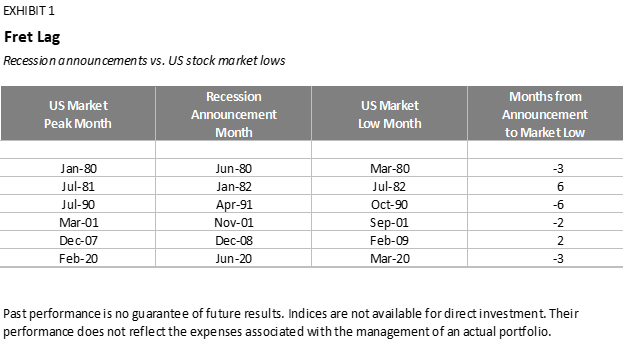Just two years removed from the last US recession, negative stock returns and aggressive US Federal Reserve interest rate hikes have many investors concerned we are headed for another big “R”—if we’re not already there. But recessions are always identified with a lag. By the time one is called, the worst of its impact on markets has usually passed.
The National Bureau of Economic Research (NBER) identifies phases of the business cycle using a bevy of indicators, such as consumption and income data, employment rates, and gross domestic product growth. None of these measures has been consistently dominant in the determination of economic conditions, and certainly past US recessions have come in all shapes and sizes. Recessions are therefore named retroactively, with the benefit of hindsight (and additional economic data that may be available with a lag).
Because recessions are proclaimed with a delay, rather than in real time, markets are often on the way toward a recovery by the time of the announcement. As shown in Exhibit 1, the stock market had already bottomed out prior to the announcement month in two-thirds of recessions since 1980.1 In 2020’s recession, for example, the market’s low point came in March, three months before the announcement in June 2020. The takeaway for investors? If and when a recession is declared, we think the most sensible approach is to remain disciplined with one’s asset allocation; reducing exposure to stocks at that point may lead to missing out on brighter days ahead.
- Prior to 1979, the NBER did not formally announce recessions.
The original version of this article has been reprinted with permission. This content is developed from sources believed to be providing accurate information and provided by Dimensional Fund Advisors. Please consult legal, finance or tax professionals for specific information regarding your individual situation. The opinions expressed and material provided are for general information and should not be considered a solicitation for the purchase or sale of any security.



